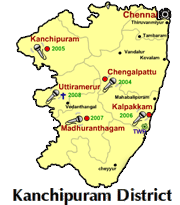Kanchi links of interest + Understanding Dalits
Kanchipuram area and history
Wiki
Decent bio site
Background of why current situation is relevant to crusade, and location is strategic:
In his Slavery in the Tamil Country: A Historical Overview, historian S. Manickam observes: “It is difficult to say when the institution of slavery originated in the South. Perhaps the conquest of southern India by the Aryans and the consequent fusion between them and the inhabitants of the land could have been the possible cause of the birth of Caste System and the institution of slavery which is closely allied with the former.”
City and seer key in history of caste system. From AICC
Understanding untouchability (Dalit oppression)
Understanding the local politics and current upheaval:
German news story with good background on controversy of nov/2004 arrest
Charge sheet outlining reason for arrest of high priest last year. (story)
case updates for those interested
Analysis of case developments and defence of Swami by reasonable Hindu apologist
I’ll make more updates if i can, but I welcome more links that you feel are relevant. Post them in comments.





August 10th, 2005 at 5:36 pm
read this!
http://across.co.nz/Dalit-6-12-02.htm
August 10th, 2005 at 6:25 pm
This is especially important… Freedom through Chist has real tangible results. and the trend that has kept freedom for millions in India elusive is well outlined here:
http://www.antislavery.org/archive/submission/submission1997-08India.htm
Point# 5. Bonded Labour and Caste Discrimination
Poverty and landlessness, combined with feudal or semi-feudal servile relationships between classes of people are universal factors in debt bondage. In India, the socially-imposed segregation of society into a caste hierarchy is an over-arching feature of all social and economic relations. The vast majority of bonded labourers belong to “scheduled castes” or “scheduled tribes”, and are placed at the very bottom of the social order. Such people are considered “untouchable” by ruling castes. Given that an overwhelming majority of those responsible for implementation of the abolition process - from state government officials to District Magistrates, to members of Vigilance Committees - come from the higher castes, it is hardly surprising that they show little enthusiasm for the abolition of bonded labour.